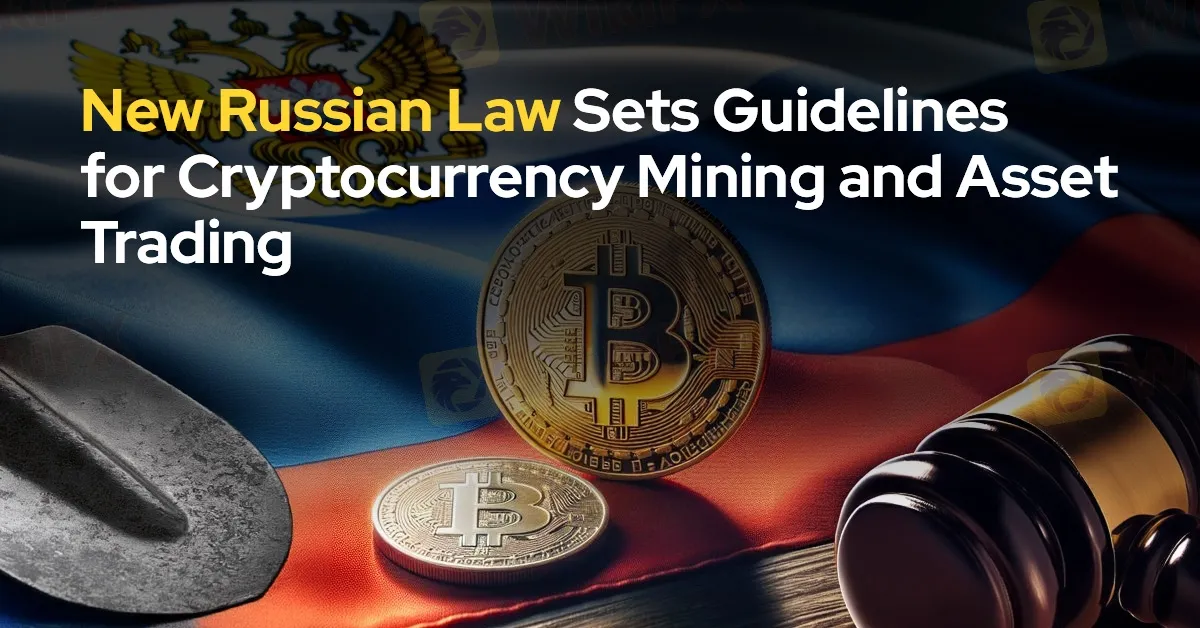简体中文
繁體中文
English
Pусский
日本語
ภาษาไทย
Tiếng Việt
Bahasa Indonesia
Español
हिन्दी
Filippiiniläinen
Français
Deutsch
Português
Türkçe
한국어
العربية
New Russian Law Sets Guidelines for Cryptocurrency Mining and Asset Trading
Abstract:Russia has taken a significant step in its approach to digital assets by officially legalizing cryptocurrency mining. The new legislation, signed into law by President Vladimir Putin, establishes a detailed legal framework for regulating cryptocurrency mining and outlines the rights and responsibilities of those involved in the sector.

Russia has taken a significant step in its approach to digital assets by officially legalizing cryptocurrency mining. The new legislation, signed into law by President Vladimir Putin, establishes a detailed legal framework for regulating cryptocurrency mining and outlines the rights and responsibilities of those involved in the sector.
Published on Russias official legal information portal, this new law brings clarity to the previously unregulated realm of cryptocurrency mining. By officially recognizing mining as a legitimate economic activity, the Russian government integrates it into the broader economic framework, rather than treating it merely as a tool for issuing digital currency.

The legislation stipulates that only Russian legal entities and registered individual entrepreneurs can legally engage in cryptocurrency mining. However, individual miners can operate without registration as long as their energy consumption remains within government-set limits. This provision allows smaller-scale miners to continue their activities with fewer formalities, while larger operations will face more stringent regulations.
In addition to legalizing mining, the law permits the trading of foreign digital financial assets on Russian blockchain platforms. Nonetheless, the Bank of Russia retains the authority to ban certain assets if they are considered a threat to the countrys financial stability. This cautious approach reflects the government's attempt to balance fostering innovation with safeguarding the financial system.
The legislation also imposes strict rules on cryptocurrency advertising and promotion. It bans the offering of digital assets to an unrestricted audience, aiming to curb the widespread promotion of potentially risky investments.
Furthermore, the law provides for the possibility of banning cryptocurrency mining in certain regions or territories, giving the government the flexibility to regulate the industry according to local conditions.
President Putin has underscored the significance of regulating cryptocurrencies and digital assets as a key area for economic growth. In a recent government meeting, he emphasized the need for Russia to capitalize on this opportunity and create a strong legal framework to support the development of digital assets both domestically and in international trade.

Disclaimer:
The views in this article only represent the author's personal views, and do not constitute investment advice on this platform. This platform does not guarantee the accuracy, completeness and timeliness of the information in the article, and will not be liable for any loss caused by the use of or reliance on the information in the article.
Read more

Crypto News: $1 Trillion Managed Funds Fail Key Compliance Tests
ASIC finds $1 trillion in managed funds failing compliance, risking investor protection with weak oversight on design, dispute resolution, and reporting.

Robinhood Launches Free Desktop Trading Platform for UK Investors
Robinhood launches its free desktop trading platform, Robinhood Legend, in the UK, offering advanced features for active investors, including 6,000 US stocks with no commissions.

Crypto Never Sleeps with Hantec Markets' 24/7 Trading
Hantec Markets has introduced round-the-clock cryptocurrency contracts for difference (CFD) trading, providing its clients with uninterrupted access to digital asset markets.

Hong Kong Approves Stablecoin Law to Boost Digital Finance
Hong Kong passes a stablecoin bill, launching a licensing regime for fiat-backed tokens to enhance digital finance and investor protection.
WikiFX Broker
Latest News
How much money will you earn by investing in Vantage Broker?
IronFX vs Exness Review 2025: Comprehensive Broker Comparison
Fraudsters Are Targeting Interactive Brokers' Users with Lookalike Emails
Interactive Brokers: Global Office Visits and Licensing Details
Top Tips to Choose the Best Forex Broker in 2025
SEBI Notifies New F&O Rules for Investors - New Derivative Trading Limits & More Amendments
U.S. Jobs Data Released: A Potential Boost for Gold Prices
SkyLine Guide 2025 Malaysia: 100 Esteemed Judges Successfully Assembled
Everything you need to know about ADSS
Vantage Markets Review 2025: Trusted Forex and CFD Trading Since 2009
Currency Calculator


